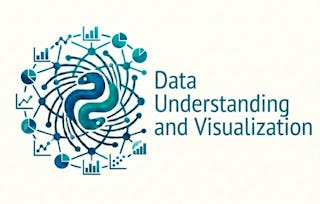By the end of this course, learners are provided a high-level overview of data analysis and visualization tools, and are prepared to discuss best practices and develop an ensuing action plan that addresses key discoveries. It begins with common hurdles that obstruct adoption of a data-driven culture before introducing data analysis tools (R software, Minitab, MATLAB, and Python). Deeper examination is spent on statistical process control (SPC), which is a method for studying variation over time. The course also addresses do’s and don’ts of presenting data visually, visualization software (Tableau, Excel, Power BI), and creating a data story.


Data Analysis and Visualization


Data Analysis and Visualization
This course is part of Data-Driven Decision Making (DDDM) Specialization


Instructors: Peter Baumgartner
20,380 already enrolled
Included with
171 reviews
Recommended experience
What you'll learn
Identify stakeholders and key components imperative to an analytics project plan
Name strengths and weaknesses of different analysis and visualization tools
Visually identify, monitor, and remove process variation
Explain how to create a compelling data story
Skills you'll gain
Details to know

Add to your LinkedIn profile
See how employees at top companies are mastering in-demand skills

Build your subject-matter expertise
- Learn new concepts from industry experts
- Gain a foundational understanding of a subject or tool
- Develop job-relevant skills with hands-on projects
- Earn a shareable career certificate

There are 4 modules in this course
This module provides an overview of the tools needed for data analysis.
What's included
6 videos6 readings1 assignment
This module covers SPC, a way to analyze variation over time in your process using data. It is helpful in identifying current problems and can also be used to monitor the process for any deviations once the process is ‘in control'.
What's included
5 videos5 readings1 assignment
This module provides tools for leveraging data through visualization and translation.
What's included
7 videos5 readings1 assignment
This module provides an opportunity to bridge theory and practice. Learners apply knowledge from this course to solve a business problem.
What's included
1 video1 reading1 peer review1 discussion prompt
Earn a career certificate
Add this credential to your LinkedIn profile, resume, or CV. Share it on social media and in your performance review.
Instructors

Explore more from Business Strategy
 Status: Free Trial
Status: Free Trial Status: Free Trial
Status: Free TrialUniversity of Colorado Boulder
 Status: Free Trial
Status: Free Trial Status: Free Trial
Status: Free Trial
Why people choose Coursera for their career

Felipe M.

Jennifer J.

Larry W.

Chaitanya A.
Learner reviews
- 5 stars
75.43%
- 4 stars
17.54%
- 3 stars
5.84%
- 2 stars
0.58%
- 1 star
0.58%
Showing 3 of 171
Reviewed on Dec 15, 2020
Examples and better instructions on the assignment would improve this course.
Reviewed on Nov 25, 2024
A great course indeed. Increased my knowledge of how to analyze data and the tools to use for the analyses.
Reviewed on Sep 11, 2022
VCe cours a ete tres important pour moi, car j'ai pu aprendre d'excellentes tectniques liees a l'analyse et visualisation de donnees, aisnique a la conception de plan d'action de projet.

Open new doors with Coursera Plus
Unlimited access to 10,000+ world-class courses, hands-on projects, and job-ready certificate programs - all included in your subscription
Advance your career with an online degree
Earn a degree from world-class universities - 100% online
Join over 3,400 global companies that choose Coursera for Business
Upskill your employees to excel in the digital economy
Frequently asked questions
To access the course materials, assignments and to earn a Certificate, you will need to purchase the Certificate experience when you enroll in a course. You can try a Free Trial instead, or apply for Financial Aid. The course may offer 'Full Course, No Certificate' instead. This option lets you see all course materials, submit required assessments, and get a final grade. This also means that you will not be able to purchase a Certificate experience.
When you enroll in the course, you get access to all of the courses in the Specialization, and you earn a certificate when you complete the work. Your electronic Certificate will be added to your Accomplishments page - from there, you can print your Certificate or add it to your LinkedIn profile.
Yes. In select learning programs, you can apply for financial aid or a scholarship if you can’t afford the enrollment fee. If fin aid or scholarship is available for your learning program selection, you’ll find a link to apply on the description page.
More questions
Financial aid available,
¹ Some assignments in this course are AI-graded. For these assignments, your data will be used in accordance with Coursera's Privacy Notice.



